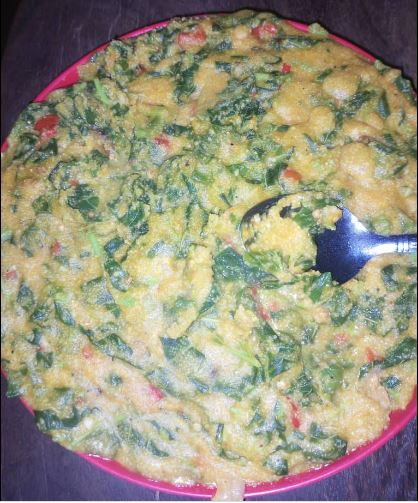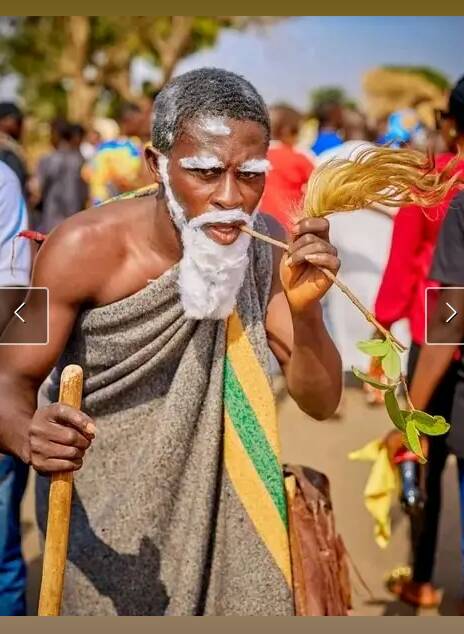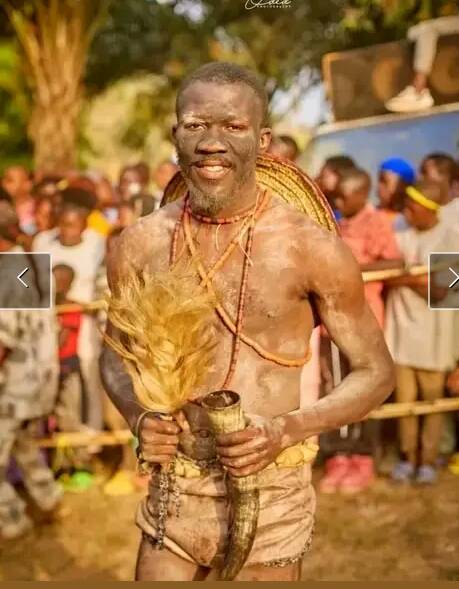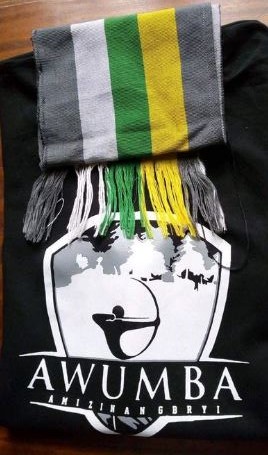
Festival
They have the Bajju day. It’s usually like a love feast with loads of traditional foods like detuk bu jajju, pikpe, jok etc. Then the traditional dance known as samba and Batram band playing their songs. The men use some ancient blankets as their costumes while the women dress in white, yellow and green materials with same colour of beads. Another festival among the Bajju is the Swa Nakan or Yanakan (end of farming celebration) although this is only practiced by the men. The men contribute to make local drinks and they also contribute chickens. They kneel and take turns at taking the local drinks. This how they celebrate end of a successful farming season.
The Bajju People Of Southern Kaduna
THE JJU or BAJJU PEOPLE OF SOUTHERN KADUNA – (commonly called, the BARANZAN race).
Bajju History And Origin Of Southern Kaduna Nigeria.
There are so many claimed of the origin of the Bajju people as stated below due to some findings.
According to oral history, the origin of the Ba̠jju can be traced as far as Bauchi State where a group of people lived in hill caves and had watchers atop the hill to watch out for enemies.
From there, Baranzan, who is described as the father of Jju or Bajju people moved to hills country side of the Jarawa Ethnic group and settled in Miango hills of Plateau state Nigeria. The Bajju migrated again to modern-day Southern Kaduna from Plateau State.
In Kaduna state, the Bajju people are commonly referred to as Kaje. They constitute one of the largest ethnic groups in Southern Kaduna.
Perhaps not too many people in the Middle Belt, even among Bajju ethnic group, are familiar with the history of their forefathers among the Jarawa and Miago people of Plateau State. Baranzan, identified as the first father of the Bajju ethnic group, first moved from Jarawa-occupied territories of the Northern Jos Plateau and settled in the Miango area.
At this point Bajju people shared the land and a culture with the Afizere people (The Jarawa). Baranzan then decided to move from Kwoll Miango because of famine and settled in the location that the Bajju people currently occupy in Kaduna.
Baranzan, later had five children who then moved to other areas to form villages and towns within Southern Kaduna. This is very significant in studying culture in the Middle Belt and Northern Nigeria. Though it is not precise about when these historic migrations happened, leaving room for archeologists and other historians to continue this research.
Also Read: Websites That Pays You Extra Cash
Work also continues the political history of the Bajju people from their precolonial past to the colonial occupation of Nigeria and post-colonial times. Bajju people were enslaved for a long time by the Hausa Fulani of Zazzau, from Shehu Usman Dan-Fodio’s Islamic jihad (1804) to the arrival of colonialists. At the arrival of British colonialists and the annexation of Northern Nigeria, the colonialists sided with the Hausa Fulani to indirectly rule the Bajju people.
What is new in this argument about Bajju politics and their oppression by both colonialists and Hausa Fulani is the discussion of their various attempts and struggles made by the Bajjus to have a leadership structure independent of traditional rulers from the Zaria emirate and Sokoto Caliphate which made them to approach the British colonialists. That’s to show that their struggles started some decades ago.
When they approached the British colonialists asking to be granted independence, the British said that unless they had the approval of the emirate of Zaria, they would not grant them their independent chiefdoms. Therefore, they would continue to be answerable to the Sarkin Jama‘a, the Hausa Fulani representative of the Zaria emirate.
Through their elders, the Bajju people sent numerous delegations to the emir of Zaria from the 1930s to the 1960s to seek their approval for traditional independent leadership, to no avail. Instead, this play for independence ended in the persecution of the delegates of the Bajju people by the emir of Zaria. McKinney notes that the Bajju people had their first traditional chief in 1996 during the military rule of General Sani Abacha, under whose government they were also allowed to create multiple chiefdoms.
Before the coming of Christianity, most Bajju people practiced their forefathers’ ancestral religions with strong beliefs in God, spirits, witches, reincarnation, medicines, traditional healers and charms. But today, we can categorically said that about 95% of the Bajju ethnic group are Christians. Though this research raises new argument about early missionary encounters in Bajju land and many parts of the Middle Belt. On her account the usage of Hausa as the language of worship in church led the people to speak more Hausa. The research also observes that missionaries could not keep up with translating the Bible for every ethnic group in the Middle Belt and Northern Nigeria, leading them to decide to use the Hausa Bible translation. As a result, most churches in Bajju territories today use Bajju, Hausa or English. And today, Holy Bible is translated in Bajju.
Through missionaries and their religious encounters, most Bajju people worldwide now are Christians, and they no longer practice the ancestral religion of their forefather, Baranzan.
The arrival of colonialists ended the Bajju people’s hostilities with the Hausa Fulani of Zaria, though from 1980 to 2000 there were a series of religious crises in which the ethnic group was involved, as well as many other ethnic groups living in Kaduna from all over the country.
Bajju people are committed to going to school and searching for a better life, causing their young people to migrate all round Nigeria.
Ruling and governance
We have just one leader just like the emir or Obas, he is called the Agwam Bajju I. We are not sure how he is selected, but he is selected only at the demise of the previous Agwam Bajju. Bature became the first monarch of the Bajju Chiefdom after its creation in 1995, following the Zangon Kataf crises of 1992 in which a resolution was reached and the creation of the long-agitated independent Chiefdom for the Atyap and Bajju from the British-imposed Zazzau Emirate was arrived at.
Dressing
The men used to dress in bente. It’s just like g-string women wear these days but it’s made with a certain kind of wool. The women used to wear fur from animal skin and leaves.
Bajju brides dress in two pieces white, green and yellow materials and beads. One piece covering the breast and the other piece is worn from the waist to some inches above the knees. While the beads are worn across the body, on the waist, head and ankles.
Food
Bajju food is basically, detuk which the Hausa call tuwo. It’s made from corn flour. It’s usually eaten with jajju also known as karkashi. Then jok kada which is basically different types of beans.


Bajju folklore (Superstitious Beliefs)
Superstitious beliefs for women:
1- Women should not eat eggs as that would mean ‘eating’ their own children. (Fetus)
2- Women are not to cook or carry out farm activities for 7 days following child birth.
3- Hitting hands or feet on the wall would be calling the Abvoi, the native god.
4- Hitting people, especially men, with brooms would be sweeping away all of his charms and power (including the power to impregnate a woman).
5- Pregnant women should not to eat sugarcanes because it could make their babies grow too fat.
6- Women do not eat gizzard, it’s strictly for men in the family.
Superstitious beliefs for men:
1- It is believed that if a man shaves his hair halfway, a spirit will come to finish the job, and cause the man to go mad
2- Food prepared by menstruating women should not be eaten by men as they would be exposed to blindness or bad luck in hunting.
3- Men are not to share their ancestral secrets with women even their wives.
In addition;
1- Bajju believe that all people, especially twins, are
born with two sets of eyes: with one set they see things in the physical realm, while the second
“nkut” sees things in the spiritual realm.
They tell children to close their nkut eyes so that they will not harm others. A person who practices nkut is termed a witch, an an əkut. People termed bəkut ətacciare usually blamed for illnesses.
2- It is simply a taboo to blow food to cool it. When a visitor comes to eat at a household, a person from the visited household must eat with the guest to prove the food is not poisoned.
3- Other general taboos of the land include the belief that snakes should not be killed as it may be the spirit of a person sleeping or having a fever.
Also, whistling in the house of a hunter could cause his charms to stop working.
Abvoi: The Bajju worship the god Abvoi. ‘Godo Abvoi’ or ‘Dodo’ is the leader of the shrine while the ‘Magajin Abvoi’ is the one who relays the messages of the god to the people.
Bajju people can be found in Southern Kaduna. The Ba̠jju paramount Leader is called A̠gwam Ba̠jju.
Women are not allowed to eat eggs as they might eat their children. Men are not to share their ancestral. The Bajju believed in reincarnation. The Bajju believed that when a shooting star passes across the sky, a great man has died somewhere and is going to land somewhere else for reincarnation.
MARRIAGE AND MARITAL RITES
According to source, there are four basic traditional marriage rites observed by the Bajju people, namely;
1- Hwun: the reservation.
The father of the male child is allowed to go to a household that has the prospective bride. The bride may be of any age at the time of the visit.
If the families are close he may even reserve a baby in the womb for his young son. To seal this, he may leave a ring or other durable item of value.
2- Bride gift:
Bajju do not believe in exchange of wealth to formalize marriage. However a gift – often a ceremonial hoe – is presented. The hoe has special significance because the people are primarily farmers.
This is accompanied by a gift for the mother-in-law – usually a goat or fowls that she may use however she chooses. At the point of this presentation the marriage is legalized. All offspring of the marry now belong to the suitor.
3- The formal announcement at the woman’s house.
The traditional beer must be prepared by the suitor’s family and sent or brought over. The elders will invite family and neighbours and eat and drink and bless the union.
After this the girl is expected to go to the house of her in-laws to return the drink containers. She will spend two days doing household chores and that will give the family a good chance to assess her before she returns.
4- The final transfer:
On a prearranged day, the girl will be sent on an errand and members of the boys village will lie in wait to ambush and abduct her and take her away. Often her cries may be heard by her own people and they will fight to stop the abduction.
If the abduction fails, the boys people will lose respect, but if they succeed they will get some gifts as acknowledgement of their efforts.
You Can Also Read: The Origin and History of Mada Tribe
FUNERAL RITES
The Bajju people used to dig and bury people in round graves. The legs of the corpse are usually broken and bent backward to the waist and same thing is done to the hands.
The corpse is usually positioned kneeling or smaller holes are dug in the grave and the chin of the corpse is placed in one of the little holes.
Afterwards, the family members pour a handful of sand into the grave before the final covering of the grave.
Then a small clay pot is kept with water on the already covered grave, while the older members of the family wash their hands and swear that if the person didn’t die a natural death, his or her death must be avenged in 7days.
Men are buried facing east while women were buried facing west.
Although, some of this practices are ancient, there is always a number of people in every community who still practice the old culture.
Bajju people had a lot of ancient superstitious beliefs highlighted below, though some have survived over time.
The Ba̠jju people are predominantly farmers, hunters, blacksmiths and petty traders.
In Kaduna state, the Bajju people are commonly referred to as Kaje. They constitute one of the largest ethnic groups in Southern Kaduna,
According to oral history, the origin of the Ba̠jju can be traced as far as Bauchi State where a group of people lived in hill caves and had watchers atop the hill to watch out for enemies.
These people were called ‘mutanen duwatsu’ which means ‘the mountain people’ in English or ‘ba̠nyet tsok in Jju).
It was believed that their migration was for the search of better hunting grounds. To put this into a clearer perspective, I would like to share a short story on origin.
A story is commonly told of how two brothers – Zampara and his younger one Awai – left a village, called Dangi on the Jos Plateau and migrated southward in search of a better hunting ground hundreds of years back.
While Awai, who is believed to be the ancestor of the Atsam (Chawai) people settled in a place where he named Chawai, his elder brother Zampara settled at a placed called Hurruang , present day Ungwan Tabo.
Zampara had two sons, Baranzan and Akad, who turned out to be the ancestors of the Bajju and the Atakat people, respectively.
After the demise of their father, Akad move to live by the hills in present day Fadan Atakar while Baranzan chose a place by a riverside called Duccuu Cheng in a place called Kajju.
The name Kajju was derived from the name which Baranzan gave the new settlement, which was Kazzu. Available evidence suggests that the Bajju have been in their current location as early as the 1800s.
The Bajju believed in reincarnation. The Bajju believed that when a shooting star passes across the sky, a great man has died somewhere and is going to land somewhere else for reincarnation.
The word Ba̠jju is a short for “Ba̠nyet Jju” which simply means “Jju People” and is used to refer to the speakers of the Jju language found in the Ka̠jju, the homeland of the Jju people.
These people ‘Bajju’ were called ‘mutanen duwatsu’ (literal translation in English from Hausa is ‘the mountainous people’ or ‘ba̠nyet tsok in Jju. It was believed that their migration was for the search of better hunting grounds.
The Afizere also lay claims to migrating from the ‘Miango’ area, presently occupied by the Irigwe. The Ba̠jju, Irigwe, and Afizere tribes collectively called themselves ‘Dangi’ (meaning ‘those of same stock’, rendered in the Hausa language) because they share cultural and linguistic similarities.
I wish more people know that Bajju is one of the largest ethnic groups in Kaduna State. They are hospitable, hardworking and generous. You need to visit Bajju community and see for yourself.

